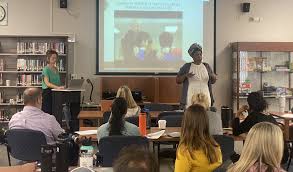Restorative Justice Practices Training Course
Restorative Justice Practices Training Course is designed to equip professionals with practical tools, evidence-based frameworks, and real-world case studies to implement restorative justice practices across educational, criminal justice, community, and organizational settings.

Course Overview
Restorative Justice Practices Training Course
Introduction
Restorative Justice Practices (RJP) are reshaping the global discourse on conflict resolution, social accountability, and healing-centered engagement. In contrast to punitive justice, restorative justice emphasizes repairing harm, rebuilding trust, and fostering community resilience through dialogue, empathy, and collaboration. Restorative Justice Practices Training Course is designed to equip professionals with practical tools, evidence-based frameworks, and real-world case studies to implement restorative justice practices across educational, criminal justice, community, and organizational settings.
Through this training, participants will gain a profound understanding of key principles such as offender accountability, victim empowerment, inclusive dialogue, and reintegration. Leveraging trauma-informed practices, cultural sensitivity, and youth-centered engagement, the course promotes sustainable conflict resolution and community empowerment. Participants will leave the program capable of facilitating restorative circles, conferencing, and mediation with competence and compassion.
Course Objectives
- Understand the core principles of restorative justice and their application in diverse contexts.
- Develop skills for trauma-informed communication and emotional intelligence in conflict resolution.
- Facilitate restorative justice circles with structure and inclusivity.
- Analyze the impact of restorative practices in school discipline reform.
- Design and implement community-based conflict resolution programs.
- Apply restorative conferencing in juvenile and criminal justice systems.
- Integrate cultural humility and anti-racist frameworks into RJP.
- Strengthen offender accountability and victim healing mechanisms.
- Utilize data-driven evaluation tools to assess RJP outcomes.
- Promote restorative leadership models in organizational conflict.
- Incorporate peer mediation and youth justice programs.
- Engage families and communities in restorative reintegration strategies.
- Build capacity for systemic change through collaborative dialogue.
Target Audiences
- Educators & School Counselors
- Social Workers & Youth Advocates
- Criminal Justice Professionals
- Mental Health Counselors
- Faith-Based Leaders
- Nonprofit & Community Organizers
- HR & Organizational Conflict Managers
- Law Enforcement & Probation Officers
Course Duration: 5 days
Course Modules
Module 1: Introduction to Restorative Justice
- Definition, philosophy, and history of restorative justice
- Differences between punitive and restorative systems
- Key stakeholders: victim, offender, community
- Benefits of restorative approaches
- Language and ethics of restoration
- Case Study: The New Zealand Youth Justice Model
Module 2: Trauma-Informed Restorative Practices
- Understanding trauma and its impact on behavior
- Emotional intelligence and self-regulation techniques
- Creating safe spaces for dialogue
- Responding to resistance and emotional triggers
- Mindfulness and presence in facilitation
- Case Study: Trauma-Informed Circles in Chicago Public Schools
Module 3: Restorative Circles and Conferencing
- Types of restorative circles (community, healing, reentry)
- Structuring the circle process
- Roles of facilitator and participants
- Techniques for active listening and empathy
- Setting agreements and closing processes
- Case Study: Conferencing in Oakland Unified School District
Module 4: School-Based Restorative Justice
- Reducing suspensions and expulsions through RJ
- Youth-led circles and peer mediation
- Engaging educators and parents
- Policy shifts and disciplinary codes
- Addressing bullying and classroom disruptions
- Case Study: Restorative Schools Initiative in Denver, CO
Module 5: Restorative Practices in Criminal Justice
- RJ in juvenile diversion and adult reentry
- Victim-offender dialogue programs
- Court-mandated RJ alternatives
- Prison-based restorative programs
- Supporting reintegration and recidivism prevention
- Case Study: Victim Impact Panels in Minnesota
Module 6: Community Conflict and Violence Intervention
- Mapping community harm and needs
- Grassroots organizing for healing justice
- De-escalation and mediation tools
- Restorative town halls and forums
- Partnerships with public systems (health, housing)
- Case Study: Community Peace Circles in Baltimore
Module 7: Equity, Inclusion & Anti-Racism in RJ
- Structural racism and justice disparities
- Cultural responsiveness in facilitation
- Addressing implicit bias and microaggressions
- Healing racial trauma through storytelling
- Allyship in restorative systems
- Case Study: Racial Equity Circles in St. Paul, MN
Module 8: Program Design, Implementation, and Evaluation
- Building a restorative justice implementation team
- Strategic planning and stakeholder engagement
- Program sustainability and funding
- Monitoring progress with key performance indicators (KPIs)
- Storytelling for advocacy and reporting impact
- Case Study: Statewide Restorative Initiative in Vermont
Training Methodology
- Interactive, experiential learning through circle practices
- Role-playing, facilitation exercises, and group dialogue
- Multimedia presentations and real-world case studies
- Reflective journaling and peer feedback
- Hands-on practice with tools and frameworks
- Assessment through scenario-based evaluations
Register as a group from 3 participants for a Discount
Send us an email: info@datastatresearch.org or call +254724527104
Certification
Upon successful completion of this training, participants will be issued with a globally- recognized certificate.
Tailor-Made Course
We also offer tailor-made courses based on your needs.
Key Notes
a. The participant must be conversant with English.
b. Upon completion of training the participant will be issued with an Authorized Training Certificate
c. Course duration is flexible and the contents can be modified to fit any number of days.
d. The course fee includes facilitation training materials, 2 coffee breaks, buffet lunch and A Certificate upon successful completion of Training.
e. One-year post-training support Consultation and Coaching provided after the course.
f. Payment should be done at least a week before commence of the training, to DATASTAT CONSULTANCY LTD account, as indicated in the invoice so as to enable us prepare better for you.